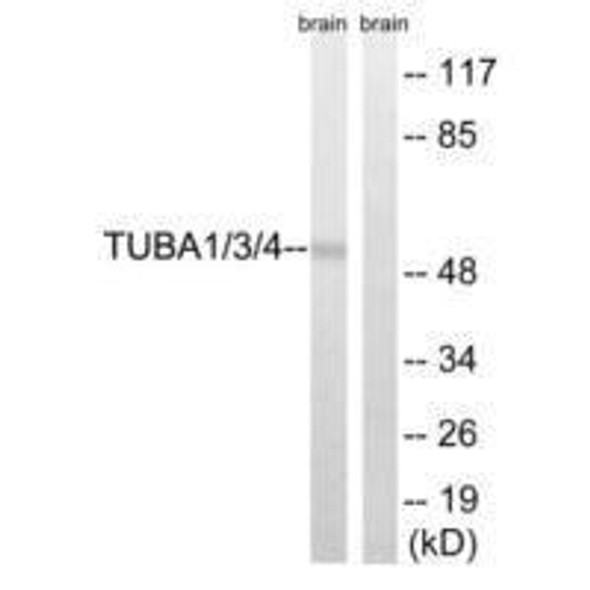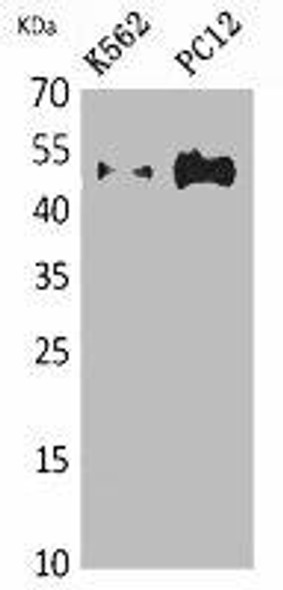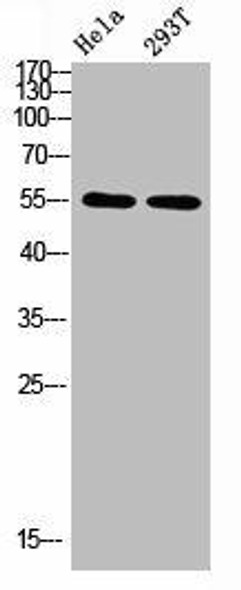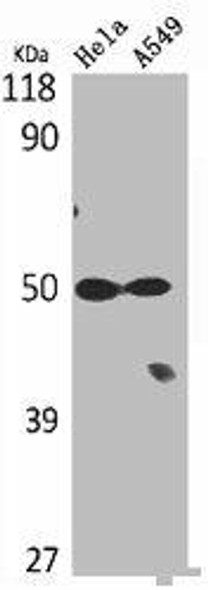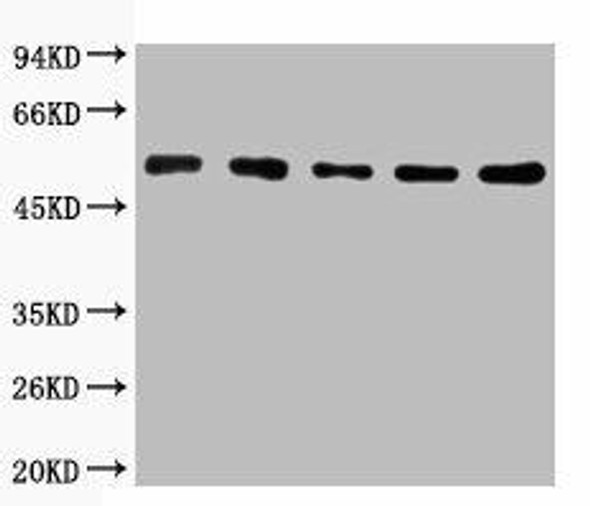Description
Phospho-TUBA1A/TUBA1B/TUBA1C/TUBA3C/TUBA3E/TUBA4A (Tyr272) Antibody (PACO24172)
The Phospho-Tuba1A/Tuba1B/Tuba1C/Tuba3C/Tuba3E/Tuba4A (Tyr272) Antibody (PAC024172) is a powerful tool for researchers studying tubulin-binding proteins involved in cell cytoskeleton dynamics and signal transduction pathways. This antibody, generated through immunization of rabbits, exhibits high specificity and sensitivity towards phosphorylated forms of Tuba1A, Tuba1B, Tuba1C, Tuba3C, Tuba3E, and Tuba4A at tyrosine 272 residue.With validated applications in Western blotting, immunofluorescence, and immunoprecipitation, this antibody enables the detection and quantification of phosphorylated Tuba proteins in various cellular contexts, allowing for detailed investigations into their roles in cell migration, cell division, and cell signaling processes.
Its versatility and reliability make it an invaluable tool for researchers in cell biology, cancer biology, and neurobiology fields seeking to unravel the complexities of tubulin-associated signaling pathways and their potential implications in human health and disease.
| Antibody Name: | Phospho-TUBA1A/TUBA1B/TUBA1C/TUBA3C/TUBA3E/TUBA4A (Tyr272) Antibody (PACO24172) |
| Antibody SKU: | PACO24172 |
| Size: | 100ul |
| Host Species: | Rabbit |
| Tested Applications: | ELISA, WB |
| Recommended Dilutions: | ELISA:1:2000-1:10000, WB:1:500-1:1000 |
| Species Reactivity: | Human, Mouse, Rat |
| Immunogen: | Peptide sequence around phosphorylation site of tyrosine 272 (A-T-Y(p)-A-P) derived from Human TUBA1/3/4. |
| Form: | Liquid |
| Storage Buffer: | Rabbit IgG in phosphate buffered saline (without Mg2+ and Ca2+), pH 7.4, 150mM NaCl, 0.02% sodium azide and 50% glycerol. |
| Purification Method: | Antibodies were produced by immunizing rabbits with synthetic phosphopeptide and KLH conjugates. Antibodies were purified by affinity-chromatography using epitope-specific phosphopeptide. Non-phospho specific antibodies were removed by chromatogramphy using non-phosphopeptide. |
| Clonality: | Polyclonal |
| Isotype: | IgG |
| Conjugate: | Non-conjugated |
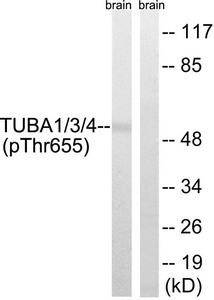 | Western blot analysis of extracts from Rat brain cells using TUBA1/3/4 (Phospho-Tyr272) Antibody.The lane on the right is treated with the antigen-specific peptide. |
| Background: | Microtubules of the eukaryotic cytoskeleton perform essential and diverse functions and are composed of a heterodimer of α and β tubulins. The genes encoding these microtubule constituents belong to the tubulin superfamily, which is composed of six distinct families. Genes from the alpha, β and γ tubulin families are found in all eukaryotes. The α and β tubulins represent the major components of microtubules, while γ tubulin plays a critical role in the nucleation of microtubule assembly. There are multiple α and β tubulin genes, which are highly conserved among species. |
| Synonyms: | TBA1; TBA1A; TBA4A; TUBA1; |
| UniProt Protein Function: | TUBA1A: Tubulin is the major constituent of microtubules. It binds two moles of GTP, one at an exchangeable site on the beta chain and one at a non-exchangeable site on the alpha-chain. Dimer of alpha and beta chains. Expressed at a high level in fetal brain. Belongs to the tubulin family. |
| UniProt Protein Details: | Protein type:Motility/polarity/chemotaxis; Cytoskeletal Chromosomal Location of Human Ortholog: 12q13.12 Cellular Component: microtubule; recycling endosome; cytoplasmic microtubule; cytosol; nucleus Molecular Function:GTPase activity; protein domain specific binding; protein binding; GTP binding; structural constituent of cytoskeleton; structural molecule activity Biological Process: protein polymerization; 'de novo' posttranslational protein folding; cellular protein metabolic process; protein folding; cell division; organelle organization and biogenesis; cytoskeleton-dependent intracellular transport; mitotic cell cycle; G2/M transition of mitotic cell cycle; microtubule-based process Disease: Lissencephaly 3 |
| NCBI Summary: | Microtubules of the eukaryotic cytoskeleton perform essential and diverse functions and are composed of a heterodimer of alpha and beta tubulins. The genes encoding these microtubule constituents belong to the tubulin superfamily, which is composed of six distinct families. Genes from the alpha, beta and gamma tubulin families are found in all eukaryotes. The alpha and beta tubulins represent the major components of microtubules, while gamma tubulin plays a critical role in the nucleation of microtubule assembly. There are multiple alpha and beta tubulin genes, which are highly conserved among species. This gene encodes alpha tubulin and is highly similar to the mouse and rat Tuba1 genes. Northern blot studies have shown that the gene expression is predominantly found in morphologically differentiated neurologic cells. This gene is one of three alpha-tubulin genes in a cluster on chromosome 12q. Mutations in this gene cause lissencephaly type 3 (LIS3) - a neurological condition characterized by microcephaly, intellectual disability, and early-onset epilepsy caused by defective neuronal migration. Alternative splicing results in multiple transcript variants encoding distinct isoforms. [provided by RefSeq, Jul 2017] |
| UniProt Code: | Q71U36 |
| NCBI GenInfo Identifier: | 55977864 |
| NCBI Gene ID: | 7846 |
| NCBI Accession: | Q71U36.1 |
| UniProt Secondary Accession: | Q71U36,P68363, |
| UniProt Related Accession: | Q71U36 |
| Molecular Weight: | ~ 55kDa |
| NCBI Full Name: | Tubulin alpha-1A chain |
| NCBI Synonym Full Names: | tubulin alpha 1a |
| NCBI Official Symbol: | TUBA1A |
| NCBI Official Synonym Symbols: | LIS3; TUBA3; B-ALPHA-1 |
| NCBI Protein Information: | tubulin alpha-1A chain |
| UniProt Protein Name: | Tubulin alpha-1A chain |
| UniProt Synonym Protein Names: | Alpha-tubulin 3; Tubulin B-alpha-1; Tubulin alpha-3 chain |
| Protein Family: | Tubulin |
| UniProt Gene Name: | TUBA1A |
| UniProt Entry Name: | TBA1A_HUMAN |




